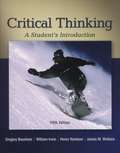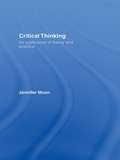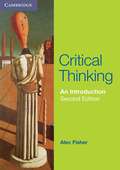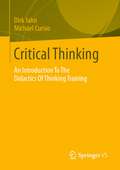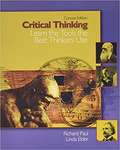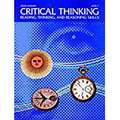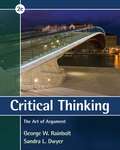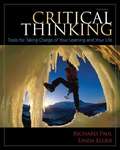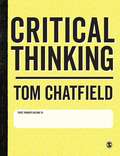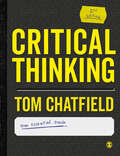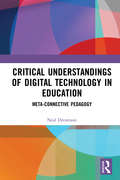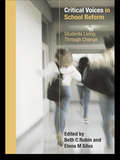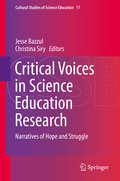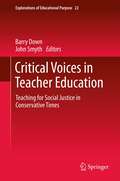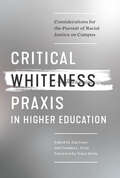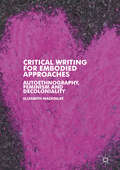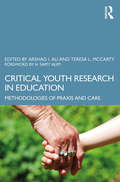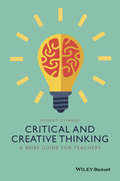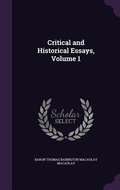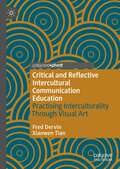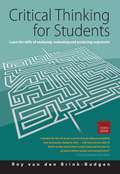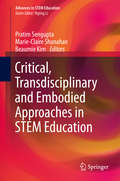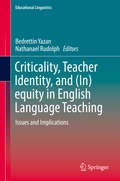- Table View
- List View
Critical Thinking: A Student's Introduction (Fifth Edition)
by William Irwin Gregory Bassham Henry Nardone James WallaceBassham's popular text helps today's students bridge the gap between everyday culture and critical thinking. Using a proven step-by-step approach, this text covers all the basics of critical thinking in clear, reader-friendly language. The 5th edition has taken into account suggestions from users and reviewers of previous editions, and has added an Appendix, and new readings, exercises and examples throughout the text.
Critical Thinking: An Exploration of Theory and Practice
by Jennifer MoonIn this book, Jennifer Moon explores and clarifies critical thinking and provides practical guidance for improving student learning and supporting the teaching process. Key themes covered include: different views of and approaches to critical thinking with an emphasis on a practical basis that can be translated into use in the classroom. links between learning, thinking and writing the place of critical thinking alongside other academic activities such as reflective learning and argument critical thinking and assessment, class environments, staff knowledge and development, writing tasks and oral tasks. Teachers in all disciplines in post-compulsory education will find this approach to defining and improving students’ critical thinking skills invaluable.
Critical Thinking: An Introduction (Second Edition)
by Alec FisherThis second edition has been extensively revised with updated examples and a brand new chapter on how to obtain reliable information from the internet. Studying critical thinking involves trying to change the ways in which most of us think. In this second edition of the popular 'Critical Thinking: An Introduction', Alec Fisher concentrates on developing critical thinking skills explicitly and directly. His aim is to teach the ability to interpret, analyse and evaluate ideas and arguments and to show how these skills can be transferred to other studies and everyday life. A new chapter covers getting reliable information from the internet and examples and passages have been replaced by completely new material. The book is also suitable for the independent learner.
Critical Thinking: An Introduction To The Didactics Of Thinking Training
by Dirk Jahn Michael CursioJudgment and critical faculties are central concerns of many Western educational programs. However, the promotion of critical thinking requires specifically developed and didactically coherent concepts. This book therefore attempts to provide a philosophically and empirically sound as well as application-oriented introduction to the concept and didactics of critical thinking. Especially the higher education space is defined by critically questioning knowledge and practice and thereby producing new insights. Against the background of this task horizon, the theoretical foundations of critical thinking as well as didactic practice strategies for its promotion are conveyed in a low-threshold manner within the framework of the introductory volume, which can be adapted across subjects.
Critical Thinking: Learn The Tools The Best Thinkers Use
by Richard Paul Linda ElderWritten by two of the leading experts in critical thinking, this book focuses on an integrated, universal concept of critical thinking that is both substantive and applicable to any and every situation in which human thinking is necessary. It provides readerse with the basic intellectual tools needed for life-long learning, helping them understand the mind and how its three functions — thinking, feeling, motivation — influence and are influenced by one another. This book fosters the development of fair-minded critical thinking. Features the intellectual standards: clarity, precision, accuracy, logicalness, significance, depth, breadth, and fairness; The importance of good questioning; and intellectual tools to read for deep and lasting comprehension, and to write in ways that show clarity of reasonability of thought. For all that want to improve their critical thinking skills to apply to their job or life.
Critical Thinking: Reading, Thinking, and Reasoning Skills
by Steck-VaughnTextbook to improve students' reading, thinking, and reasoning skills.
Critical Thinking: The Art of Argument (Second Edition)
by George W. Rainbolt Sandra L. DwyerWith a complete, approachable presentation, CRITICAL THINKING: THE ART OF ARGUMENT, 2nd Edition, is an accessible yet rigorous introduction to critical thinking. The text emphasizes immediate application of critical-thinking skills to everyday life. The relevance of these skills is shown throughout by highlighting the advantages of basing decisions on a thoughtful understanding of arguments and presenting the overarching commonalities across arguments. With its conversational writing style and carefully selected examples, the book employs a consistent and unified treatment of logical form and an innovative semi-formal method of standardizing arguments that illustrates the concept of logical form while maintaining a visible connection to ordinary speech. Without sacrificing accuracy or detail, the authors have clearly presented the material with appropriate study tools and exercises that emphasize application rather than memorization.
Critical Thinking: Tools for Taking Charge of Your Learning and Your Life (Third Edition)
by Richard Paul Linda ElderFor Student Success and Career Development, or Critical Thinking courses. Written by two of the leading experts in the field, this book's approach to critical thinking is as a process for taking charge of and responsibility for one’s thinking. Critical Thinking is based in theory developed over the last 30 years, it focuses on an integrated, comprehensive concept of critical thinking that is both substantive and practical; it fosters the development of basic intellectual skills students need to think through content in any class, subject, or discipline, as well as through any problem or issue they face. Simply stated, this text offers students the intellectual tools they need for lifelong learning, and rational, conscientious living. In this edition, several advanced chapters were eliminated, many diagrams have been added or enhanced, and the glossary of critical thinking terms has been more strongly developed.
Critical Thinking: Your Guide to Effective Argument, Successful Analysis and Independent Study
by Tom ChatfieldThis helpful book is your personal toolkit for demystifying critical engagement. Author Tom Chatfield will show you how to sharpen your critical thinking by developing and practicing this specific set of skills, so you can… <P><P><ul> <li>Spot an argument and understand why reasoning matters</li> <li>Discover errors and evaluate evidence</li> <li>Understand and account for bias</li> <li>Become a savvy user of technology</li> <li>Develop clear, confident critical writing</li> </ul>
Critical Thinking: Your Guide to Effective Argument, Successful Analysis and Independent Study
by Tom ChatfieldWhat is critical thinking? How do you apply it in your assessments? How do you build a good argument or find evidence? Critical thinking is a set of techniques. You just need to learn them. This is your personal toolkit for demystifying critical thinking. Clear and focused, it shows you how to sharpen your ability to think critically by developing and honing your skills. You’ll learn how to: Build a solid argument and express your ideas clearly Evaluate evidence and identify errors Understand and account for biased or flawed thinking Become a savvy user of technology Sift through the deluge of digital information Develop confident critical writing. Designed to work with a power pack of digital resources and exercises, you′ll find practical and effective tools to think and write critically in an information-saturated age. Whether you′re starting your first degree or arriving as an international or mature student, this book equips you with the skills, insights and confidence to succeed. This second edition has been redesigned and fine-tuned with a focus on accessibility: with a new and improved layout to improve the eBook experience, and updated language, examples and further reading recommendations throughout.
Critical Thinking: Your Guide to Effective Argument, Successful Analysis and Independent Study
by Tom ChatfieldWhat is critical thinking? How do you apply it in your assessments? How do you build a good argument or find evidence? Critical thinking is a set of techniques. You just need to learn them. This is your personal toolkit for demystifying critical thinking. Clear and focused, it shows you how to sharpen your ability to think critically by developing and honing your skills. You’ll learn how to: Build a solid argument and express your ideas clearly Evaluate evidence and identify errors Understand and account for biased or flawed thinking Become a savvy user of technology Sift through the deluge of digital information Develop confident critical writing. Designed to work with a power pack of digital resources and exercises, you′ll find practical and effective tools to think and write critically in an information-saturated age. Whether you′re starting your first degree or arriving as an international or mature student, this book equips you with the skills, insights and confidence to succeed. This second edition has been redesigned and fine-tuned with a focus on accessibility: with a new and improved layout to improve the eBook experience, and updated language, examples and further reading recommendations throughout.
Critical Understandings of Digital Technology in Education: Meta-Connective Pedagogy
by Neal DreamsonThis book explores the underlying assumptions, beliefs, and values of prevailing theories, frameworks, models, and principles in digital technology education through the metaphysical lenses of ontology, epistemology, axiology, and methodology. By proposing meta-connective pedagogy that reflects the ecological, transformative nature of the digitally networked world, Dreamson repositions learners in the networked world for their authentic engagement. Covering key domains of digital technology education, this volume explores topics such as meta-connective learning; digital identity formation; emergent communities and co-laboured learning; interdisciplinary and transdisciplinary knowledge production; teacher attitudes towards the relationship between learning and technology; learner engagement and online interaction; transformative digital literacy; meta-analysis of technology integration frameworks; methodology for authentic digital engagement; and meta-connective ethics. Critical Understandings of Digital Technology in Education is the perfect resource for in-service and preservice teachers, as well as researchers and specialist teachers in technology and information and communication technology education fields who are looking to enhance their pedagogical understandings of digital technology.
Critical Voices in School Reform: Students Living through Change
by Beth C. Rubin Elena M. SilvaSchool reform of one kind or another is a priority for education systems the world over. Yet the voices of students - those most affected by, and most pivotal to, the success or failure of any program of school reform - are rarely heard on this topic. This is the first book to look at school reform from the perspective of the students. The studies included in this collection focus on reform initiatives aimed at overcoming persistent patterns of racial, class and gender inequality. The authors combine the theoretical aspects of research with its practical applications, making this an invaluable resource for teacher educators, classroom practitioners, researchers and policymakers.Critical Voices in School Reform: Students Living Through Change is divided into two parts. Part one describes and analyses programs of reform that turned out contrary to the intentions of adult reformers, illustrating the - often unspoken - tension between adult and student perspectives on school change. Part two looks at reform initiatives that were able to harness student energies and thereby improve pupils' engagement with school life. These reforms, which are finely attuned to the needs and interests of students, offer clear, valuable guidance to those trying to create more equitable school experiences. A concluding chapter draws together the themes and insights gained from looking at school reform through a student-centred lens and offers suggestions for more relevant and lasting reform.
Critical Voices in Science Education Research: Narratives of Hope and Struggle (Cultural Studies of Science Education #17)
by Jesse Bazzul Christina SiryThis book is a collection of narratives from a diverse array of science education researchers that elucidate some of the difficulties of becoming a science education researcher and/or science teacher educator, with the hope that through solidarity, commonality, and “telling the story”, justice-oriented science education researchers will feel more supported in their own journeys. Being a scholar and teacher that sees science education as a space for justice, and thinking/being different, entry into this disciplinary field often comes with tense moments and personal difficulties. The chapter authors of this book break into many painful, awkward, and seemingly nebulous topics, including the intersectional nuances of what it means to be a researcher in the contexts of epistemic rigidness, white supremacy, and neoliberal restructuring. Of course these contexts become different depending on how teachers, students, and researchers are constituted within them (as racialized/sexed/gendered/disposable/valued subjects). We hope that within these narratives readers will identify with similar struggles in terms of what it means to desire to “do good in the world”, while facing subtle and not-so-subtle institutional, personal cultural, and political challenges.
Critical Voices in Teacher Education: Teaching for Social Justice in Conservative Times (Explorations of Educational Purpose #22)
by John Smyth Barry DownWe live in dangerous times when educational policies and practices are debated largely in terms of how they fit with the needs of the free market. This volume is a collection of writing by teacher-educators that draws on their unique biographies, experiences and perspectives to denounce these misguided norms. It explores what it means--practically and intellectually--to teach for social justice in conservative times. In a globalised world where the power of capital holds sway, the purposes of social institutions such as universities and schools is being refashioned in ways that are markedly instrumental and technicist in nature. The consequence is that teachers' work is increasingly constrained by regimes of control such as standardised testing, accountability, transparency, and national curricula. In the meantime, large numbers of students and teachers are disengaging physically, emotionally and intellectually from learning. The contributors to this edited volume present both a powerful critique of these developments and a counter-hegemonic vision of teacher education founded on the principles and values of social justice, democracy and critical inquiry. Teacher education, they argue, involves a commitment to critical intellectual work that subjects some deeply entrenched assumptions, beliefs, habits, routines and practices to closer scrutiny. The contributing authors expose how ideology and power operate in seemingly blameless, rational ways to perpetuate social hierarchies based on class, gender, sexuality, race and culture.
Critical Whiteness Praxis in Higher Education: Considerations for the Pursuit of Racial Justice on Campus
by Tracy Davis Zak Foste Tenisha L. TevisCollege and university administrators are increasingly called to confront the deeply entrenched racial inequities in higher education. To do so, corresponding attention must be given to historical and contemporary manifestations of whiteness in higher education and student affairs.This book bridges theoretical and practical considerations regarding the ways whiteness functions to underwrite racially hostile and unwelcoming campus communities for People of Color, all the while upholding the interests and values of white students, faculty, and staff.While higher education scholars and practitioners have long explored the role of race and racism in college and university contexts, rarely have they done so through a lens of Critical Whiteness Studies (CWS). Exploring such topics through the lens of CWS offers new opportunities to both examine white identities, attitudes, and ways of being, and to explicitly name how whiteness is embedded in environments that marginalize and oppress students, faculty, and staff of color. This book is especially concerned with naming the material consequences of whiteness in the lives of People of Color on college and university campuses in the United States.Part one of the book introduces theoretical ideas and concepts administrators, scholars, and activists might use to interrogate how whiteness functions on campus. Part two of the book explores practical considerations for how whiteness functions across campus spaces, including student leadership programs, fraternity and sorority life, faculty tenure and promotion, LGBTQ support services, and so forth.
Critical Writing for Embodied Approaches: Autoethnography, Feminism and Decoloniality
by Elizabeth MackinlayAutoethnography is a unique discipline which steps inside and outside the self to experience, embody and express social and cultural meaning. At once a performative, political and poetic genre of research writing, it holds the potential to uncover the ‘heart of the world’, if only for a moment. The author uses theory as story and story as theory to explore her place in the world through painstaking and intimate self and social narratives to lay bare the unique challenges and rewards of autoethnography. Framed around the metaphor of ‘heartlines’, the author explores autoethnographic practice as critical feminist and decolonial work and the power it holds for not only imagining a wise, ethical and loving world, but for making such a kind place possible. Through a performative journey of the heart, we travel with the author as she unearths the power of words, of writing and not-writing, evoking in particular the work of Hélène Cixous and Virginia Woolf. This reflective, passionate and pioneering volume will be of interest and value to all those interested in autoethnography and the ways in which it can be applied as critical, ethical and political work in the social sciences.
Critical Youth Research in Education: Methodologies of Praxis and Care
by Teresa L. McCarty Arshad Imtiaz AliCritical studies of youth play an increasingly important role in educational research. This volume adds to that ongoing conversation by addressing the methodological lessons learned from key scholars in the field. With a focus on “the doing” of critical youth studies in ways that center praxis and relational care in work with youth and their communities, the volume showcases scholars discussing their research and reflecting on the practical strategies they have used to operationalize their conceptions of knowledge in youth-centered research projects. Each chapter addresses the research features, challenges, tensions, and debates of the project; engagement with communities; and relationality, reciprocity, and responsibility to participants. The focus throughout is on qualitative approaches that are humanizing, anti-colonial, and transformative.
Critical and Creative Thinking: A Brief Guide for Teachers
by Robert DiYanniCritical and Creative Thinking: A Guide for Teachers reveals ways to develop a capacity to think both critically and creatively in practical and productive ways. Explains why critical and creative thinking complement each other with clear examples Provides a practical toolkit of cognitive techniques for generating and evaluating ideas using both creative and critical thinking Enriches the discussion of creative and critical intersections with brief “inter-chapters” based on the thinking habits of Leonardo da Vinci Offers an overview of current trends in critical and creative thinking, with applications across a spectrum of disciplines
Critical and Historical Essays -- Volume 1
by Baron Thomas Babington Macaulay MacaulayCritical and Historical Essays: Contributed to the Edinburgh Review (1843) is a collection of articles by Thomas Babington Macaulay, later Lord Macaulay. They have been acclaimed for their readability, but criticized for their inflexible attachment to the attitudes of the Whig school of history.
Critical and Reflective Intercultural Communication Education: Practicing Interculturality Through Visual Art
by Fred Dervin Xiaowen TianThis book provides answers to the following questions: How could visual art support us in reflecting about interculturality critically? When we look at, engage with and experience art, what is it that we can learn, unlearn and relearn about interculturality? The book adds to the multifaceted and multidisciplinary field of intercultural communication education by urging those working on the notion of interculturality (researchers, scholars and students) to give art a place in exploring its complexities. No knowledge background about art (theory) is needed to work through the chapters. The book helps us reflect on ourselves and on our engagement with the world and with others, and learn to ask questions about these elements. The authors draw on anthropology, linguistics, philosophy and sociology to enrich their discussions of critical interculturality.
Critical thinking for Students 4th Edition
by Roy Van Den Brink-BudgenCritical Thinking is a core skill needed to make all your studies more effective. This totally revised and updated book is a must if you want to find out how to develop your own arguments and evaluate other people's. Specifically, you will need to look at others' assumptions and their use of evidence. Learn too how to spot, and rectify, weaknesses of your own. An indispensable book, especially for students following the OCR AS-level course in Critical Thinking.
Critical thinking for Students 4th Edition: Learn The Skills Of Analysing, Evaluating And Producing Arguments (How To Books (oxford, England) Ser.)
by Roy Van Den Brink-BudgenCritical Thinking is a core skill needed to make all your studies more effective. This totally revised and updated book is a must if you want to find out how to develop your own arguments and evaluate other people's. Specifically, you will need to look at others' assumptions and their use of evidence. Learn too how to spot, and rectify, weaknesses of your own. An indispensable book, especially for students following the OCR AS-level course in Critical Thinking.
Critical, Transdisciplinary and Embodied Approaches in STEM Education (Advances in STEM Education)
by Pratim Sengupta Marie-Claire Shanahan Beaumie KimOver the past decade, integrated STEM education research has emerged as an international concern, creating around it an imperative for technological and disciplinary innovation and a global resurgence of interest in teaching and learning to code at the K-16 levels. At the same time, issues of democratization, equity, power and access, including recent decolonizing efforts in public education, are also beginning to be acknowledged as legitimate issues in STEM education. Taking a reflexive approach to the intersection of these concerns, this book presents a collection of papers making new theoretical advances addressing two broad themes: Transdisciplinary Approaches in STEM Education and Bodies, Hegemony and Decolonization in STEM Education. Within each theme, praxis is of central concern including analyses of teaching and learning that re-imagines disciplinary boundaries and domains, the relationship between Art and STEM, and the design of learning technologies, spaces and environments. In addition to graduate research seminars at the Masters and PhD levels in Learning Sciences, Science Education, Educational Technology and STEM education, this book could also serve as a textbook for graduate and pre-service teacher education courses.
Criticality, Teacher Identity, and: Issues And Implications (Educational Linguistics #35)
by Nathanael Rudolph Bedrettin YazanThis edited volume, envisioned through a postmodern and poststructural lens, represents an effort to destabilize the normalized “assumption” in the discursive field of English language teaching (ELT) (Pennycook, 2007), critically-oriented and otherwise, that identity, experience, privilege-marginalization, (in)equity, and interaction, can and should be apprehended and attended to via categories embedded within binaries (e.g., NS/NNS; NEST/NNEST). The volume provides space for authors and readers alike to explore fluidly critical-practical approaches to identity, experience, (in)equity, and interaction envisioned through and beyond binaries, and to examine the implications such approaches hold for attending to the contextual complexity of identity and interaction, in and beyond the classroom. The volume additionally serves to prompt criticality in ELT towards reflexivity, conceptual clarity and congruence, and dialogue.
